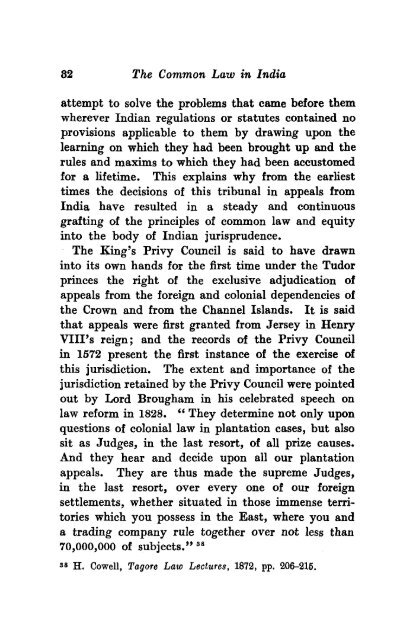The Common Law in India - College of Social Sciences and ...
The Common Law in India - College of Social Sciences and ...
The Common Law in India - College of Social Sciences and ...
- No tags were found...
Create successful ePaper yourself
Turn your PDF publications into a flip-book with our unique Google optimized e-Paper software.
82 <strong>The</strong> <strong>Common</strong> <strong>Law</strong> <strong>in</strong> <strong>India</strong>attempt to solve the problems that came before themwherever <strong>India</strong>n regulations or statutes conta<strong>in</strong>ed noprovisions applicable to them by draw<strong>in</strong>g upon thelearn<strong>in</strong>g on which they had been brought up <strong>and</strong> therules <strong>and</strong> maxims to which they had been accustomedfor a lifetime. This expla<strong>in</strong>s why from the earliesttimes the decisions <strong>of</strong> this tribunal <strong>in</strong> appeals from<strong>India</strong> have resulted <strong>in</strong> a steady <strong>and</strong> cont<strong>in</strong>uousgraft<strong>in</strong>g <strong>of</strong> the pr<strong>in</strong>ciples <strong>of</strong> common law <strong>and</strong> equity<strong>in</strong>to the body <strong>of</strong> <strong>India</strong>n jurisprudence.<strong>The</strong> K<strong>in</strong>g's Privy Council is said to have drawn<strong>in</strong>to its own h<strong>and</strong>s for the first time under the Tudorpr<strong>in</strong>ces the right <strong>of</strong> the exclusive adjudication <strong>of</strong>appeals from the foreign <strong>and</strong> colonial dependencies <strong>of</strong>the Crown <strong>and</strong> from the Channel Isl<strong>and</strong>s. It is saidthat appeals were first granted from Jersey <strong>in</strong> HenryVIII's reign; <strong>and</strong> the records <strong>of</strong> the Privy Council<strong>in</strong> 1572 present the first <strong>in</strong>stance <strong>of</strong> the exercise <strong>of</strong>this jurisdiction. <strong>The</strong> extent <strong>and</strong> importance <strong>of</strong> thejurisdiction reta<strong>in</strong>ed by the Privy Council were po<strong>in</strong>tedout by Lord Brougham <strong>in</strong> his celebrated speech onlaw reform <strong>in</strong> 1828. " <strong>The</strong>y determ<strong>in</strong>e not only uponquestions <strong>of</strong> colonial law <strong>in</strong> plantation cases, but alsosit as Judges, <strong>in</strong> the last resort, <strong>of</strong> all prize causes.And they hear <strong>and</strong> decide upon all our plantationappeals. <strong>The</strong>y are thus made the supreme Judges,<strong>in</strong> the last resort, over every one <strong>of</strong> our foreignsettlements, whether situated <strong>in</strong> those immense territorieswhich you possess <strong>in</strong> the East, where you <strong>and</strong>a trad<strong>in</strong>g company rule together over not less than70,000,000 <strong>of</strong> subjects." 38»» H. Cowell, Tagore <strong>Law</strong> Lectures, 1872, pp. 206-216.
















